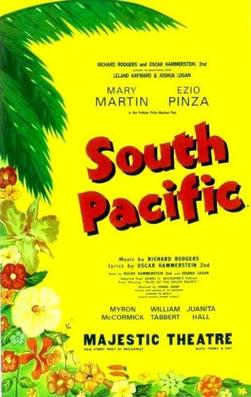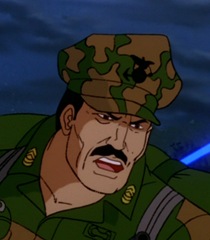
Theseus was a divine hero and the founder of Athens from Greek mythology. The myths surrounding Theseus, his journeys, exploits, and friends, have provided material for storytelling throughout the ages.

Madama Butterfly is an opera in three acts by Giacomo Puccini, with an Italian libretto by Luigi Illica and Giuseppe Giacosa.

South Pacific is a musical composed by Richard Rodgers, with lyrics by Oscar Hammerstein II and book by Hammerstein and Joshua Logan. The work premiered in 1949 on Broadway and was an immediate hit, running for 1,925 performances. The plot is based on James A. Michener's Pulitzer Prize–winning 1947 book Tales of the South Pacific and combines elements of several of those stories. Rodgers and Hammerstein believed they could write a musical based on Michener's work that would be financially successful and, at the same time, send a strong progressive message on racism.

David Allan Coe is an American singer and songwriter. Coe took up music after spending much of his early life in reform schools and prisons, and first became notable for busking in Nashville. He initially played mostly in the blues style, before transitioning to country music, becoming a major part of the 1970s outlaw country scene. His biggest hits include "You Never Even Called Me by My Name", "Longhaired Redneck", "The Ride", "Mona Lisa Lost Her Smile", and "She Used to Love Me a Lot".

Virgil Walter Earp was both deputy U.S. Marshal and Tombstone, Arizona, City Marshal when he led his younger brothers Wyatt and Morgan, and Doc Holliday, in a confrontation with outlaw Cowboys at the Gunfight at the O.K. Corral on October 26, 1881. They killed brothers Tom and Frank McLaury and Billy Clanton. All three Earp brothers had been the target of repeated death threats made by the Cowboys who were upset by the Earps' interference in their illegal activities. All four lawmen were charged with murder by Ike Clanton, who had run from the gunfight. During a month-long preliminary hearing, Judge Wells Spicer exonerated the men, concluding they had been performing their duty.

Cosmic Boy is a superhero appearing in comics published by DC Comics. He is from the 31st century, and is a founding member and original leader of the Legion of Super-Heroes.

The Brides of Dracula are fictional characters in Bram Stoker's 1897 novel Dracula. They are three seductive vampire "sisters" who reside with Count Dracula in his castle in Transylvania, where they entice men with their beauty and charm, and then proceed to feed upon them. Dracula provides them with victims to devour, mainly implied to be infants.
"Streets of Laredo", also known as "The Dying Cowboy", is a famous American cowboy ballad in which a dying ranger tells his story to another cowboy. Members of the Western Writers of America chose it as one of the Top 100 Western songs of all time.

Superboy-Prime, also known as Superman-Prime or simply Prime, is a DC Comics superhero turned supervillain and an alternate version of Superman. The character first appeared in DC Comics Presents #87 and was created by Elliot S. Maggin and Curt Swan.

A singing cowboy was a subtype of the archetypal cowboy hero of early Western films. It references real-world campfire side ballads in the American frontier, the original cowboys sang of life on the trail with all the challenges, hardships, and dangers encountered while pushing cattle for miles up the trails and across the prairies. This continues with modern vaquero traditions and within the genre of Western music, and its related New Mexico, Red Dirt, Tejano, and Texas country music styles. A number of songs have been written and made famous by groups like the Sons of the Pioneers and Riders in the Sky and individual performers such as Marty Robbins, Gene Autry, Roy Rogers, Tex Ritter, Bob Baker and other "singing cowboys". Singing in the wrangler style, these entertainers have served to preserve the cowboy as a unique American hero.

Patton's speech to the Third Army was a series of speeches given by General George S. Patton to troops of the United States Third Army in 1944, prior to the Allied invasion of France. The speeches were intended to motivate the inexperienced Third Army for its pending combat duty.

In Greek mythology, Meriones was the Cretan son of Molus and Melphis or Euippe. Molus was a half-brother of Idomeneus. Like other heroes of mythology, Meriones was said to be a descendant of gods. As a grandson of Deucalion, Meriones' ancestors include Zeus, Europa, Helios, and Pasiphae, the sister of Circe. Meriones possessed the helmet of Amyntor, which Autolycus had stolen. He inherited the helmet from his father Molus and later gave it to Odysseus. Meriones killed seven men at Troy.

Roadsongs is a live album of cover songs released by folk/country singer–songwriter Townes Van Zandt in 1994.

Ragnarok is a supervillain appearing in American comic books published by Marvel Comics. A cyborg clone of the hero Thor, Ragnarok has a similar appearance and abilities but uses them in opposition to the established heroes.

"Streets of Bakersfield" is a 1973 song written by Homer Joy and popularized by Buck Owens. In 1988, Owens recorded a duet version with country singer Dwight Yoakam, which became one of Yoakam's first No. 1 Hot Country Singles hits.

Leatherneck is a fictional character from the G.I. Joe: A Real American Hero toyline, comic books and animated series. He is a Marine with the G.I. Joe Team and debuted in 1986.

"Lavender (Nightfall Remix)" is a 2017 song by American rapper Snoop Dogg. It is a remixed version of the BadBadNotGood (BBNG) song "Lavender" with lyrics added which addressed the issue of police brutality in the United States. It was released with a music video which caused some controversy because of a scene depicting a mock assassination of U.S. President Donald Trump. The song was included in Snoop's 2017 album Neva Left.













